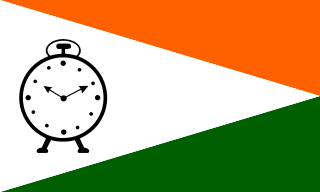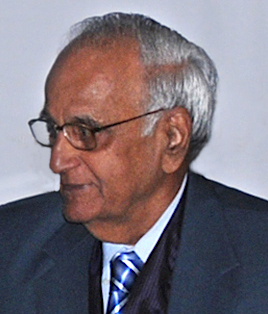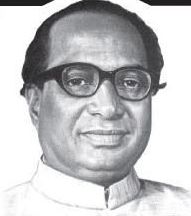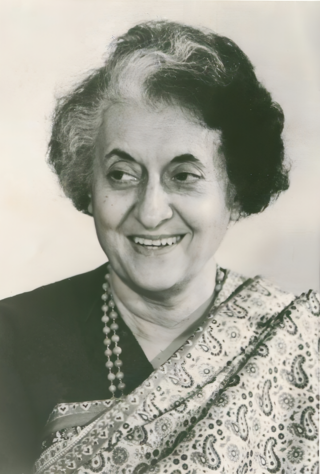
Chidambaram Subramaniam, was an Indian politician and independence activist. He served as Minister of Finance and Minister of Defence in the union cabinet. He later served as the Governor of Maharashtra. As the Minister for Food and Agriculture, he ushered the Indian Green Revolution, an era of self-sufficiency in food production along with M. S. Swaminathan, B. Sivaraman and Norman E. Borlaug. He was awarded Bharat Ratna, Indian's highest civilian award, in 1998, for his role in ushering Green Revolution.

Sharadchandra Govindrao Pawar is an Indian politician. He has served as the Chief Minister of Maharashtra for four terms and has also served in the Union Council Of Ministers as the Minister of Defence in the Cabinet of P.V Narsimha Rao and Minister of Agriculture in the Cabinet of Manmohan Singh. He is the first and former president of the Nationalist Congress Party (NCP), which he founded in 1999, after separating from the Indian National Congress. His NCP was split by his own nephew, Ajit Pawar. He leads his faction of the NCP delegation in the Rajya Sabha, the upper chamber of the Indian parliament. He is the chairperson of Maha Vikas Aghadi, a regional Maharashtra-based political alliance.

The Nationalist Congress Party is one of the state parties in India. It refers to the Ajit Pawar faction after the 2023 split in the party when the Supreme Court of India granted the original party name and symbol to the Nationalist Congress Party. It was one of the major political parties in Maharashtra and was a recognised state party in Nagaland and Kerala. In July 2023, majority of the elected MLAs and MLCs of the party led by Ajit Pawar joined the National Democratic Alliance government, however, all MPs except two remained loyal to Sharad Pawar. This caused a direct split between the Ajit Pawar-led faction and the founder and president Sharad Pawar who formed the Nationalist Congress Party after EC recognised the Ajit Pawar faction as the original party.
Events in the year 1960 in the Republic of India.(post Independence period)
Indian Congress (Socialist) (IC(S)) also known as Congress (Secular) was a political party in India between 1978 and 1986.
Telangana Praja Samithi or Telangana Peoples Convention was an Indian political party which fought for statehood for the Telangana region.

The Indian National Congress (Organisation) also known as Congress (O) or Syndicate/Old Congress was a political party in India formed when the Congress party split following the expulsion of Indira Gandhi.

Yashwantrao Balwantrao Chavan was an Indian freedom fighter and politician who served as 8th Minister of Finance from 1970 to 1971 & 1971 to 1974. He served as the last Chief Minister of Bombay State and the first of Maharashtra after latter was created by the division of Bombay state. His last significant ministerial post was as the Deputy Prime Minister of India in the short lived Charan Singh government in 1979.
Devaraj Devaraj Urs was an Indian politician who served two terms as the first Chief Minister of Karnataka, a state in southern India. He is also the longest serving Chief Minister of Karnataka in terms of days of tenure in office. He entered politics in 1952 and was an MLA for 10 years. When the Indian National Congress split in 1969 as Samstha and Indira Congress, he stood with Indira Gandhi. He became the Chief Minister of Karnataka for the first time from 20 March 1972 to 31 December 1977 and later for the second time from 17 March 1978 to 8 June 1980.

Ram D. Pradhan was an Indian Administrative Service officer, from the 1952 batch who served as Union Home Secretary and Governor of Arunachal Pradesh during the Rajiv Gandhi government.
Indian Congress (Socialist) – Sarat Chandra Sinha was a political party in India between 1984 and 1999. The party was formed through a split in the Indian Congress (Socialist), and was led by former Assam Chief Minister (1971–78), Sarat Chandra Sinha.

General elections were held in India on 3 and 6 January 1980 to elect the members of the 7th Lok Sabha. The Janata Party alliance came into power in the 1977 general elections amidst public anger with the Indian National Congress (R) and the Emergency. However, its position was weak; the loose coalition barely held on to a majority with only 295 seats in the Lok Sabha and never quite had a firm grip on power. Bharatiya Lok Dal leaders Charan Singh and Jagjivan Ram, who had quit the Congress, were members of the Janata alliance but were at loggerheads with Prime Minister Morarji Desai.

Gulabrao Raghunathrao Patil was a Renowned Co-operative Leader, Member of Parliament (MP)-Rajya Sabha India, Maharashtra State Sangli from 1966 to 1978,Member of the Legislative Council (MLC) of Maharashtra 1983−87 and president of Maharashtra Pradesh Congress(I) Committee 1981−82. Patil also served as chairman of Maharashtra State Co-operative Bank in Mumbai from 1980 to 1982, chairman of Sangli District Cooperative Bank Sangli and Secretary of National Co-operative Union of India (NCUI), New Delhi. Gulabrao Patil was regarded as a Maratha Strongman in Maharashtra politics in the 1970s and 1980s. Year 2020–2021 is going to celebrate as Birth Centenary Year of Late. Gulabrao Patil (1921–2021)

The Maharashtra Pradesh Congress Committee is the state unit of the Indian National Congress for the state of Maharashtra. It is responsible for organizing and coordinating the party's activities and campaigns within the state, as well as selecting candidates for local, state, and national elections in Maharashtra. The head office of the organization is situated in Dadar, Mumbai and administrative office in Colaba Causeway, Mumbai

The First Indira Gandhi ministry was formed on 24 January 1966 under the premiership of Indira Gandhi who was elected as the Prime Minister of India by the Congress Parliamentary Party to succeed Gulzarilal Nanda who was serving as the acting prime minister since 11 January 1966 following the untimely demise of Lal Bahadur Shastri. The cabinet remained in office until the 1967 general election in which Indira Gandhi was re-elected to office.

Charan Singh was sworn in as Prime Minister on 28 July 1979, with outside support by Indira Congress and Yashwantrao Chavan of Congress (Socialist) faction as his Deputy PM. Just before Singh was to prove his majority in Lok Sabha, Indira Gandhi withdrew support to his government, and he resigned on 20 August 1979, after just 23 days, becoming the only PM who didn't face the parliament. He advised President Neelam Sanjiva Reddy to dissolve Lok Sabha. Janata Party leader Jagjivan Ram challenged the advice and sought time to cobble support. But Lok Sabha was dissolved, and Charan Singh continued as caretaker PM until January 1980.
A. C. Shanmughadas was an Indian politician. He was Kerala MLA for Balussery from 1970 until 2006.
Although a parliamentary democracy, Indian politics has increasingly become dynastic, possibly due to the absence of a party organization, independent civil society associations that mobilize support for the party, and centralized financing of elections. Family members have also led the Congress party for most of the period since 1978 when Indira Gandhi floated the then Congress(I) faction of the party. It also is fairly common in many political parties in Maharashtra. The dynastic phenomenon is seen from national level down to district level and even village level.The three-tier structure of Panchayati Raj established in the 1960s also helped to create and consolidate the dynastic phenomenon in rural areas. Apart from government,political families also control cooperative institutions, mainly cooperative sugar factories,district cooperative banks in the state, and since the 1980s private for profit colleges. The ruling Bharatiya Janata Party also features several senior leaders who are dynasts. In Maharashtra, the NCP has particularly high level of dynasticism.
Indian National Congress is a political party in India.










